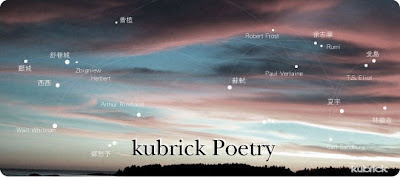Last December, we went to see Alan Bennett’s new play,
The Habit of Art, which is about an imaginary meeting between W.H. Auden and Benjamin Britten (this is in a way similar to Adam Fould's novel
The Quickening Maze, which centres on an imagery meeting between John Clare and the young Tennyson). We bought the tickets
primarily to see Michael Gambon. Unfortunately he was not well enough to perform and was replaced by the excellent Richard Griffiths (whom we liked from
The History Boys). Was the show good? Suffice it to say that at the interval I went to buy
a signed copy of the play. And I got to see Gambon in
Krapp's Last Tape, which I wrote about
here.
The Habit of Art has many memorable quotes; I’ll try to include only those related to writing.
- So let’s talk about the vanity. This one, the connoisseur of emptiness, is tipped for the Nobel Prize yet still needs to win at Monopoly. That playwright’s skin is so thin he can feel pain on the other side of the world … so why is he deaf to the suffering next door? Proud of his modesty, this one gives frequent, rare interviews in which he aggregates praise and denudes others of credit. Artists celebrated for their humanity, they turn out to be scarcely human at all.
- Why poets should be interviewed I can’t think. A writer is not a man of action. His private life is or should be of no concern to anyone except himself, his family and his friends. The rest is impertinence.
- Poetry to me is as much a craft as an art and I have always prided myself on being able to turn my hand to anything — a wedding hymn, a requiem, a loyal toast … No job too small. I would have been happy to have hunt up a shingle in the street: “W. H. Auden. Poet.”
- Writers in particular perceive biography as a threat, something I had still to learn. Poets are particularly vulnerable to biography because readers naturally assume they are sincere, that their verses are dispatches from the heart, the self at its most honest. When the biographer reveals the self is sometimes quite different, the poet is thought a hypocrite. I’m thinking of Robert Frost.
- When I was young my poems were often reports from the top of my head. I wrote the first thing that occurred to me and it was poetry. Now when I take more care, and it truly is a dispatch from the heart … it is not poetry at all.
- Do you mind not doing that? You should not quote a poet’s words back at him. It is a betrayal of trust. A poem is a confidence. Besides which many of my poems embarrass me. they don’t seem — Dr Leavis’s word — authentic. People tell me off for censoring my poems, rewriting them, or cutting some well-loved lines. I tell them it’s because I can no longer endorse those particular sentiments, but it’s also because I’m fed up with hearing them quoted. (Ironically.) ‘We must love one another or we die.’ (Shudders.)
- This is England all over. Hasn’t even mastered fellatio.
- The play is not about cocksucking.
- The genitals are fascinating too, because they’re shape-shifting. Subject to desire obviously, but to fear and cold and the innate propensity of all flesh to creep. The penis has a personal character every bit as much as its owner and very often the two are quite different. Have you found that? Men are incongruously equipped in their very essence ….
- I have the habit of art. I write poems of a cosy domesticity trying to catch the few charred emotions that scuttle across my lunefied landscape. Still, writing is apparently therapeutic. That’s what they say these days, isn’t it? It is therapeutic. When I was young I envied Hardy’s hawk-like vision… his way of looking at life from a great height. I tried to do that, only now I suppose I have come down to earth. He has taken the words out of my mouth.
- What I fear is that on Judgement Day one’s punishment will be to hear God reciting by heart the poems I would have written had my life been good.
- Readers are so literal-minded. If you say you’re fond of somewhere, the question that arises in the ordinary reader’s mind is why, if you like it so much, don’t you go and live there. ‘You talk about Westmoreland but you live in New York. You’re a hypocrite.’
- We do not contain life. It contains us, holds us sometimes in its jaws. The senile, the demented, life has them in its teeth … in the cracks and holes of its teeth, maybe, but still in its teeth. They cannot let go of it until it lets go of them.
- There are some writers who set their sights on the Nobel Prize before they even pick up the pen. Elias Canetti is like that. And I’m afraid Thomas Mann. Never underestimate the role of the will in the artistic life. Some writers are all will. Talent you can dispense with, but not will. Will is paramount. Not joy, not delight, but grim application.
- When I was young I used to leave meaning to chance. If it sounded right I left the meaning take care of itself. It’s why I find some of my early stuff so embarrassing. [...] Except that now I’m more scrupulous and make an effort to tell the truth, people say it’s dull and my early stuff was better.
- This is the nature of style. It imposes itself. [...] Style is the sum of one’s imperfections… what one can’t do, as much as what one can…
- Death isn’t the payment. Death is just the checkout.
- Dirt is everywhere.
- Or whatever age it is nowadays that beauty can be legally admired. The boy Thomas Mann actually saw and took a fancy to was eleven. Mann wrote him up as being fourteen. Now you’re suggesting sixteen. At this rate he’ll soon be drawing a pension.
- Our passport is what we have written.
- There’s no malice in it. It’s just an entirely human desire for completion… the mild satisfaction of drawing a line under you. Death shapes a life. Dead, you see, you belong to your admirers in your entirety. They own you. They can even quote you to your face — only it will be a dead face — at your memorial service perhaps, or when they unveil the stone in Westminster Abbey. Over and done with: W. H. Auden. Benjamin Britten. Next.
- I would find it intolerable myself if only because of the degree of self-relegation involved. A biographer is invariably second-rank even when he or she is first-rate.
- (This is the ‘rent-boy’ speaking) No, not Caliban, whoever he was. And not in the language of Henry James, or any other tosser. No. Me. Us. Here. Now. When do we figure and get to say our say? The great men’s lives are neatly parcelled for posterity, but what about us? When do we take our bow? Not in biography. Not even in diaries.’A boy came around. Picked up on the hill. Didn’t stay.”Your grandfather was sucked off by W. H. Auden.”Benjamin Britten sat naked on the side of my bath.’Because if nothing else, we at least contributed. We were in attendance, we boys of art. And though there’s the odd photograph, nobody remembers who they’re of: uncaptioned or ‘with an unidentified friend’, unnamed girls, unnameable boys, the flings, the tricks. The fodder of art.
- It cannot be said too often: what matters is the work. That night in Vienna I read from my poem on the death of Yeats.-
Earth, receive an honoured guest;
William Yeats is laid to rest:
Let the Irish vessel lie
Emptied of its poetry.
-
Time that is intolerant
Of the brave and innocent,
And indifferent in a week
To a beautiful physique,
-
Worships language and forgives
Everyone by whom it lives;
Pardons cowardice, conceit,
Lays its honours at their feet.
-
Time that with this strange excuse
Pardoned Kipling and his views,
And will pardon Paul Claudel,
Pardons him for writing well.
-
Follow, poet, follow right
To the bottom of the night,
With your unconstraining voice
Still persuade us to rejoice;
-
In the deserts of the heart
Let the healing fountain start,
In the prison of his days
Teach the free man how to praise.
-
-
















































































